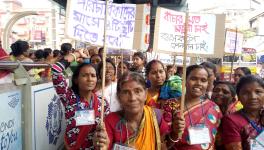A Fifth of Women Workers in Delhi Moved from Informal to Formal Sector Since 2010: Study
Representational use only.Image Source: TOI
A study has found that one-fifth of the women working in Delhi’s informal sector migrated to the formal sector between 2010 and 2019.
The study was conducted by the Institute for Human Development (IHD) on women employed in the informal sector in the national capital. It is based on a repeat survey (conducted more than once) of 900 of the actual 1400 women surveyed in 2010, the Times of India reported.
According to the study, three out of 10 women changed their jobs in the nine-yar period and moved from construction labour, domestic work and vending to sales, tuition or teaching, beautician and helper or assistants in offices and factories.
However, the study pointed out that women, who are more experienced, possess higher educational qualifications and belong to higher income groups, along with being upper caste and non-migrants,
have a greater chance of mobility from informal to formal sector compared to other groups. Educational qualification and experience are the two most important components.
The study said that informal sector workers face poor working conditions, long working hours, lack of safety or security,and lack of credit facility among other problems. Meanwhile, only four out of 10 women were aware of various welfare schemes of the government, it said.
“Many women engaged in the informal sector are unable to benefit from the several government schemes due to lack of documents or the cumbersome processes,” Balwant Singh Mehta, who conducted the study, told TOI.
To improve the condition of informal workers, the IHD study advised that the government should create a national database on informal workers and it should be regularly updated. Such workers
should be assisted with documentation to link them with existing social security and welfare schemes. It also suggested regulations regarding payment and working conditions of domestic workers, skill training for unskilled workers, along with financial support for self-employment after their training.
Get the latest reports & analysis with people's perspective on Protests, movements & deep analytical videos, discussions of the current affairs in your Telegram app. Subscribe to NewsClick's Telegram channel & get Real-Time updates on stories, as they get published on our website.
























